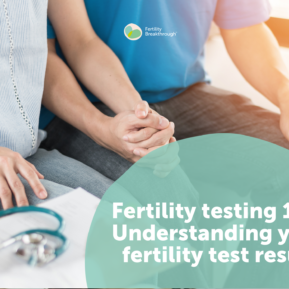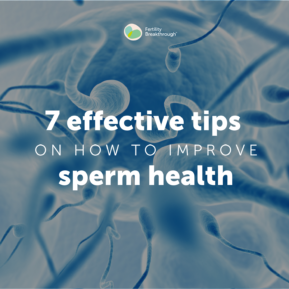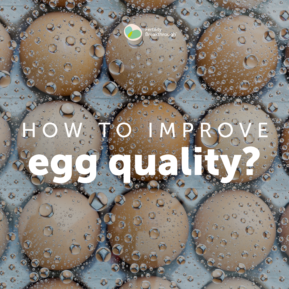Polycystic ovarian syndrome (PCOS) is one of the most common endocrine abnormalities, that is also known to be a leading cause of infertility in women of childbearing age. [1] Despite affecting up to 10% of females, there are ways or steps to manage PCOS naturally. Factual statistics aside, being diagnosed with it does not and should not mean an “infertility sentence.” Having PCOS does not automatically mean employing IVF or other forms of assisted reproductive technologies; or resorting to fertility drugs or pharmaceutical medications in order to manage symptoms, and/or to successfully achieve conception. [2,3] In this article, we are going to discuss how the combination of diligent self-care and lifestyle interventions can help manage PCOS and increase pregnancy success naturally. In understanding that there is more to what you can do to optimise your health and fertility, you will realize that you are ultimately in control. [4,5]
PCOS: Signs and symptoms
PCOS is essentially a metabolic syndrome resulting in increased insulin levels and blood sugar irregularities. It is also characterized by hormonal imbalances and multiple ovarian follicles arranged in a pearl necklace shape around the ovaries. It involves an overproduction of ovarian androgens (male hormones) leading to a diverse range of signs and symptoms including:[6,7]
- Hirsutism (excessive or male-pattern hair growth)
- Acne
- Difficulty losing weight and/or obesity
- Oligo-ovulation (irregular ovulation) or
- Anovulation (lack of ovulation)
- Infertility
For in-depth information about having a proper diagnosis, read How to diagnose Polycystic ovarian syndrome.
Natural ways to manage PCOS
If you are trying to conceive naturally with PCOS, the ultimate aim is to balance metabolic function — particularly blood sugar and insulin levels. This single step can make all the difference in relation to reducing the production of ovarian androgens, which in turn helps in regulating ovulation and effectively managing all other related symptoms.[8] Here are three steps to manage PCOS naturally:
1. Having a proper diet
If we use the 80/20 rule (Paretto’s principle) which broadly states that 20% of one’s effort is responsible for 80% of one’s results — your diet constitutes a great majority of the 20% you want your attention and efforts to focus upon, which will deliver 80% of your desired outcomes. So what does controlling PCOS through diet entail? Follow these guidelines:[9,10]
Base your meals on good quality, preferably organic vegetables and protein.
Avoid all fried foods, trans fats, and hydrogenated fats (heated vegetable oil which have been shown to reduce ovulation potential in women with PCOS by as much as 73%).
Cut out sugar-containing and high glycaemic foods as much as possible.
Avoid all packaged and processed foods, especially snacks and junk foods.
For more tips on having optimum hormonal balance through a fertility diet, read Are there any other options to help get pregnant if you have PCOS?
2. Engaging in the right exercise routine
Just like how diet provides the essential building blocks for optimum health and fertility, exercise also plays a huge physical role in harmonizing metabolic function and balancing hormones. Aim for doing something daily, for at least 40 minutes. Ultimately, it is best to mix your exercise routines to ensure a good balance between cardiovascular and resistance or weighted exercises.[11,12]
The former does not only support cardiovascular health, but is also responsible for quickly helping with the balancing of insulin and blood sugar levels.[13,14] Meanwhile, the latter helps in building muscle mass (and/or reducing loss) which is important for long-term health and proper metabolism.
Remember that exercise to reverse PCOS goes hand in hand with diet to ensure proper management of symptoms, better health, and optimum fertility. A suitable diet and exercise regime are paramount in ensuring an appropriate weight management, which is essential for all women (especially those with PCOS).
If you are getting stuck with your diet plan, seek the help of a nutritionist or dietician. And if you are not yet a fan of exercise, look for a group class format or seek out physical activities you find fun to get you started. A personal trainer can also be helpful to keep you accountable.[15]
3. Undergoing holistic herbal treatment and having nutritional support
Natural interventions, such as herbal medicines and nutritional treatments, are highly effective in conjunction with diet and exercise to help address any and all PCOS-related symptoms. And unlike pharmaceutical prescriptions like the pill to “regulate” cycles and metformin for blood sugar control, natural medicines for PCOS support the body in gently and naturally balancing itself.[4]
No matter what the form of treatment you choose, remember that management is long-term. Seek the assistance of a professional healthcare practitioner, and do not self prescribe for best results.
Final thoughts
Making the best daily choices is the underlying theme behind these three steps to manage PCOS naturally. When done diligently and consistently, these will enable you to reach your treatment objectives during your reproductive years. With the right approach, everything can be made possible — just like how your dream parenthood can only be a few steps away from turning into reality.
Miscarriages, Still Birth, PCOS and Weight Loss is a fertility webinar which offers a wealth of expert advice and further insights about the said concerns, straight from Fertility Specialist and Harvard University awarded scholar Gabriela Rosa.
References:
[1] Bozdag, G., et al. The Prevalence and Phenotypic Features of Polycystic Ovary Syndrome: A Systematic Review and Meta-Analysis. Human Reproduction, 2016. 31(12). PMID: 27664216.
[2] Rausch, M.E., et al. Predictors of Pregnancy in Women with Polycystic Ovary Syndrome. Journal of Clinical Endocrinology and Metabolism, 2009. 94(9). PMID: 19509098.
[3] Costello, M.F., et al. Evidence summaries and recommendations from the international evidence-based guideline for the assessment and management of polycystic ovary syndrome: assessment and treatment of infertility. Human Reproduction, 2019. PMID: 31486807.
[4] Arentz, S., et al. Combined Lifestyle and Herbal Medicine in Overweight Women With Polycystic Ovary Syndrome (PCOS): A Randomized Controlled Trial. Phytotherapy Research, 2017. 31(9). PMID: 28685911.
[5] Sawant, S., et al. Fertility Treatment Options for Women With Polycystic Ovary Syndrome. Clinical Medicine Insights, 2019. PMID: 31908561.
[6] Lim, S.S., et al. Metabolic Syndrome in Polycystic Ovary Syndrome: A Systematic Review, Meta-Analysis and Meta-Regression. Obesity Reviews, 2019. 20(2). PMID: 30339316.
[7] Parker, M., et al. Adherence to Treatment for Polycystic Ovarian Syndrome: A Systematic Review. PLoS One, 2020. 15(2). PMID: 32053629.
[8] Balen, A.H., et al. The management of anovulatory infertility in women with polycystic ovary syndrome: an analysis of the evidence to support the development of global WHO guidance. Human Reproduction Update, 2016. 22(6). PMID: 27511809.
[9] Moran, L.J., et al. Dietary Composition in the Treatment of Polycystic Ovary Syndrome: A Systematic Review to Inform Evidence-Based Guidelines. Journal of the Academy of Nutrition and Dietetics, 2013. 113(4). PMID: 23420000.
[10] Chavarro, J.E., et al. Dietary Fatty Acid Intakes and the Risk of Ovulatory Infertility. American Journal of Clinical Nutrition, 2007. 85(1). PMID: 17209201.
[11] Harrison, C.L., et al. Exercise Therapy in Polycystic Ovary Syndrome: A Systematic Review. Human Reproduction Update, 2011. 17(2). PMID: 20833639.
[12] Kite, C., et al. Exercise, or exercise and diet for the management of polycystic ovary syndrome: a systematic review and meta-analysis. Systematic Reviews, 2019. 8(1). PMID: 30755271.
[13] Thomas, M.H., et al. Increasing Lean Mass and Strength: A Comparison of High Frequency Strength Training to Lower Frequency Strength Training. International Journal of Exercise Science, 2016. 9(2). PMID: 27182422.
[14] Kogure, G.S., et al. Hyperandrogenism Enhances Muscle Strength After Progressive Resistance Training, Independent of Body Composition, in Women With Polycystic Ovary Syndrome. Journal of Strength and Conditioning Research, 2018. 32(9). PMID: 29927897.
[15] Naderpoo, N., et al. Metformin and Lifestyle Modification in Polycystic Ovary Syndrome: Systematic Review and Meta-Analysis. Human Reproduction Update, 2015. 21(5). PMID: 26060208.
Sign up today for unlimited access:
- Book appointments
- Expert advice & tips
- Premium videos & audio
- Curated parenting newsletters
- Chat with your bloss community
- Discounts & competitions
- Special events





Leave a Rating / Review
You must be logged in to post a comment.